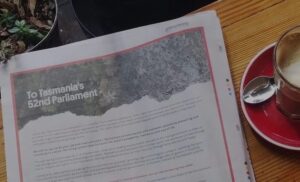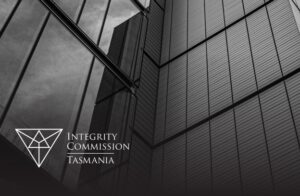Everyone is saying Tasmania is a becoming a clean energy powerhouse, so how do we make sure ordinary Tasmanians get a piece of the action?
One of the best solutions would be for communities to become investors and take power back from corporations and governments.
Few people realise that communities can own energy companies. In the US, Rural Electric Cooperatives serve an incredible 42 million people. They own assets worth $US112 billion and include everything from smart new batteries to energy retailers to old style generation and even the poles and wires. The community energy co-ops employ about 70,000 Americans.
As Tasmania’s political parties jostle for support in this state election, it’s a great time to ask how Tasmanians could do this for themselves.
I was on the board of Australia’s first community-owned power plant, the Hepburn Wind project in Central Victoria. I know it is very hard to run a power station —even a relatively small, 4.1 MW wind farm.
The easiest way for Tasmanians to get in the fast lane is a financial model known as community co-ownership.
The community invests in a commercial project that is already going ahead, therefore the community doesn’t need to spend years designing a project and then learn how to operate it.
This model is being used right now at the biggest wind farm project in NSW, the $588 million Sapphire Wind Farm. The community company will own a small share of the wind farm and get an income from the electricity sold. It does not have to take responsibility for the operation.
Compare that half-billion dollar price tag for the whole of Sapphire Wind Farm, to the more community-sized example of Hepburn Wind. We raised almost $10 million from almost 2000 investors, and mostly they came from the local area.
Community co-ownership means locals are brought into the centre of the energy business. It can help share the profits of energy generation in rural areas, generate jobs and encourage tourism. It can bring the community together around a common, clean-energy purpose.
The hundred-billion dollar energy co-ops movement in America began as part of US President Roosevelt’s New Deal, during the Great Depression. Australian energy consumers must all feel like we deserve a New Deal of our own —prices are going up, security is doing down and politicians can’t stop arguing.
During the Great Depression, America’s poor rural communities were denied electrification. Power companies were busily building the grid in the big cities and wealthy parts of America while leaving most of the landmass behind.
While 90 per cent of city dwellers had electricity, only 10 per cent of country people did. That is what drove Roosevelt to turbocharge the growth of electric co-ops.
We are at the beginning of another huge revolution in energy and Tasmanians can, and should, get their fair share. New technologies like batteries are unstoppable.
Smart Australian start-ups are challenging the energy industry with new models and products on the mainland.
Political conflict has led to policy uncertainty and that is holding back investment and pushing up prices. The Australian Energy Council estimates that the uncertainty bred by Tony Abbott’s climate wars have cost us as much as a carbon price of $50 per tonne.
Our energy market is a mess, but Tasmanian communities can reap the rewards by buying in to the clean energy solution.
According to Bloomberg New Energy Finance, the global solar and wind sectors will grow into a $9.5 trillion dollar market by 2040, without subsidies. To put it another way —almost 10 million million dollars.
Clean energy, batteries, electric vehicles and the rest is vast business. There is no reason why Tasmanian communities cannot share in the spoils.
Dan Cass, a strategist at the Australia Institute, was a board director of Hepburn Wind. @danjcass
Between the Lines Newsletter
The biggest stories and the best analysis from the team at the Australia Institute, delivered to your inbox every fortnight.
You might also like
Open Letter to the Tasmanian Government
The Australia Institute and 30 other organisations from around Tasmania have published an open letter with 10 asks for the environment from whomever forms Tasmania’s next government. When cross-benchers and major parties have struck successful power-sharing agreements elsewhere, they covered policy as well as procedure, making now the ideal time for progress.
Are Australians eating diseased salmon? Sickening new revelations from Tasmania
Shocking new revelations about Tasmanian salmon should leave all Australians feeling sick to the stomach.
Underfunded, toothless and lacking transparency – time for a new era of integrity in Tasmania
As Tasmania’s newly elected politicians jostle to form government, new analysis from The Australia Institute shows that a deal to address integrity would be popular among election-weary voters.


